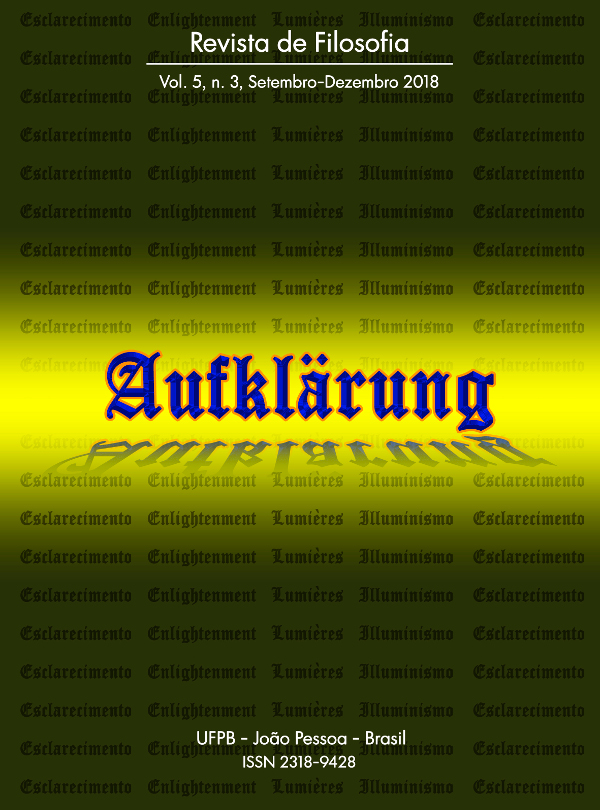Deleuze's reversal of Platonism: Focus on his criticism of anámnesis
DOI:
https://doi.org/10.18012/arf.2016.41190Palavras-chave:
Deleuze, Plato, Recollection, Difference and repetition, Image of thoughtResumo
Gilles Deleuze's critical reception of Plato´s philosophy is developed under the formula of its reversal, the task Nietzsche entrusted future philosophy with. But what does this reversal mean? Deleuze's reversal of Platonism has been widely discussed. Most of the studies focus mainly on “Platon et le simulacre”, where Deleuze characterizes reversal on the basis of the concept of simulacrum, and his further elaboration in Difference and repetition. An aspect of reversal that has not been considered so far is Deleuze's reversal of the Platonic image of thought, which is expressed through his critical reading of Plato's theory of anámnesis. In our paper we show that this criticism is a fundamental core of the task of reversal.
Downloads
Referências
Alliez, Eric, “Ontologie et logographie. La pharmacie, Platon et le simulacre” Nos grecs et leurs modernes (B. Cassin, pp. 211–230). Paris: Éditions du seuil, 1992.
Annas, Julia, An Introduction to Plato’s Republic. Oxford: Oxford University Press, 1981.
Audouard, Xavier, “Le Simulacre”, Cahiers Pour L´analyse, 3, 57–72, 1966.
Bedu‐Addo, “Sense‐experience and the Argument for Recollection in Plato’s Phaedo”. Phronesis, 36(1), 27–60, 1991.
Burnet, John, Plato. Platonis Opera (ed.). Oxford: Oxford University Press, 1903.
De Beistegui, Miguel, “The Deleuzian reversal of Platonism” The Cambridge Companion to Deleuze (D. Smith, H. Somers-Hall, pp. 55–82). Cambridge: Cambridge University Press, 2012.
Deleuze, Gilles, Proust et les signes. Paris: Presses Universitaires France, 1964.
Deleuze, Gilles, Différence et Répétition. Presses Universitaires de France, 1968.
Deleuze, Gilles, Logique du sens. Editions de Minuit, 1969.
Deleuze, Gilles, Deux régimes de fous. Paris: Les éditions de minuit, 2003.
Deleuze, Gilles & Guattari, Félix, L´Anti-OEdipe. Paris: Les éditions de minuit, 1972.
Ginoux, Isabel (2005). Platon. In Aux sources de la pensé de Gilles Deleuze (S. Leclerc, Vol. 1, pp. 155–160). Paris: Sils Maria Éditions, 2005.
Bloom, Allan (Trans.) Plato. Republic (3 edition). New York: Basic Books, 2016.
Proust, Marcel, A la recherche du temps perdu. Du côté de chez Swann (Vol. 1). Paris: Gallimard, 1919.
Runciman, W. G., Plato’s Later Epistemology (1st edition). Cambridge University,1962.
Ryle, Gilbert “Logical Atomism in Plato ́s Theaetetus.” Phronesis, XXXV, 21–46, 1990.
Scott, Dominic “Platonic Recollection.” In G. Fine (ed.) Metaphysics and Epistemology (pp. 93–124). Oxford: Oxford University Press, 1999.
Smith, Daniel The concept of the simulacrum: Deleuze and the overturning of Platonism. Continental Philosophy Review, (38), 89–123, 2006.
Williams, James Deleuze´s Difference and repetition: a critical introduction and guide. Edinburgh: Edinburgh University Press, 2003.
Wolff, Francis Trios. Deleuze, Derrida, Foucault, historiens du platonisme. In B. Cassin (Comp.) pp. 232–249. Paris: Éditions du seuil, 1992.
Arquivos adicionais
Publicado
Como Citar
Edição
Seção
Licença
Política de Direito Autoral para os itens publicados pela Revista:
1.Esta revista é regida por uma Licença da Creative Commons aplicada a revistas eletrônicas. Esta licença pode ser lida no link a seguir: Creative Commons Attribution 4.0 International (CC BY 4.0).
2.Consonante a essa politica, a revista declara que os autores são os detentores do copyright de seus artigos sem restrição, e podem depositar o pós-print de seus artigos em qualquer repositório ou site.
Política de Direito de Uso dos Metadados para informações contidas nos itens do repositório
1. Qualquer pessoa e/ou empresa pode acessar os metadados dos itens publicados gratuitamente e a qulquer tempo.
2.Os metadados podem ser usados sem licença prévia em qualquer meio, mesmo comercialmente, desde que seja oferecido um link para o OAI Identifier ou para o artigo que ele desceve, sob os termos da licença CC BY aplicada à revista.
Os autores que têm seus trabalhos publicados concordam que com todas as declarações e normas da Revista e assumem inteira responsabilidade pelas informações prestadas e ideias veiculadas em seus artigos, em conformidade com a Política de Boas Práticas da Revista.






































